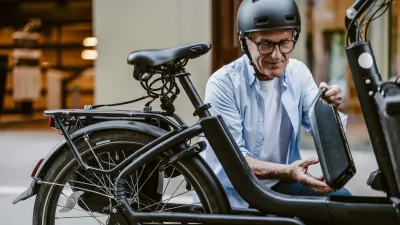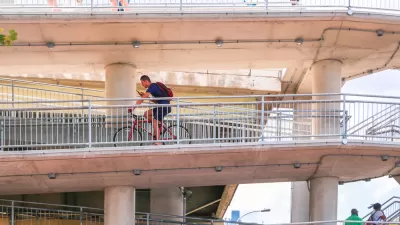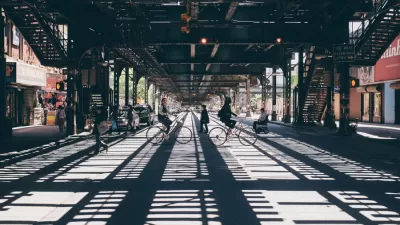Tanya Snyder examines the various ways in which bicyclists bring increased business and added value to their local communities.
Despite common misconceptions that make officials and business owners resistant to adding bike infrastructure, bicycle advocates are making headway in arguing that bikes bring an economic boost to cities.
According to Snyder, "Far and away, the biggest reason business owners resist the addition of bike infrastructure is that they're afraid it will limit parking. Once they realize they can get 12 bike parking spaces for each car spot, sometimes they begin to change their tune. Even better, they begin to discover that cyclists can be their best customers. 'We tend to shop closer to home and shop more often,' said April Economides, a consultant who helped the city of Long Beach, California build bicycle-friendly business districts."
In St. Louis, Washington University quantified the economic benefit of Open Streets events, and found that "73 percent of Open Streets participants spent money at a restaurant or store on the route, and 68 percent became aware of a restaurant or store that was new to them."
The economic benefits of bike infrastructure development don't stop there, notes Snyder: trails bring tourists and bike paths increase property values.
"Add to that the fact that bike lane construction creates about twice as many jobs as road-building for the same amount of money, and you've got yourself a great economic argument to take to local leaders and politicians when you ask them to support walking and biking – even (or especially) in tough economic times." says Snyder.
FULL STORY: Why Bicyclists Are Better Customers Than Drivers for Local Business

Trump Administration Could Effectively End Housing Voucher Program
Federal officials are eyeing major cuts to the Section 8 program that helps millions of low-income households pay rent.

Planetizen Federal Action Tracker
A weekly monitor of how Trump’s orders and actions are impacting planners and planning in America.

Ken Jennings Launches Transit Web Series
The Jeopardy champ wants you to ride public transit.

California Invests Additional $5M in Electric School Buses
The state wants to electrify all of its school bus fleets by 2035.

Austin Launches $2M Homelessness Prevention Fund
A new grant program from the city’s Homeless Strategy Office will fund rental assistance and supportive services.

Alabama School Forestry Initiative Brings Trees to Schoolyards
Trees can improve physical and mental health for students and commnity members.
Urban Design for Planners 1: Software Tools
This six-course series explores essential urban design concepts using open source software and equips planners with the tools they need to participate fully in the urban design process.
Planning for Universal Design
Learn the tools for implementing Universal Design in planning regulations.
Ada County Highway District
Clanton & Associates, Inc.
Jessamine County Fiscal Court
Institute for Housing and Urban Development Studies (IHS)
City of Grandview
Harvard GSD Executive Education
Toledo-Lucas County Plan Commissions
Salt Lake City
NYU Wagner Graduate School of Public Service





























